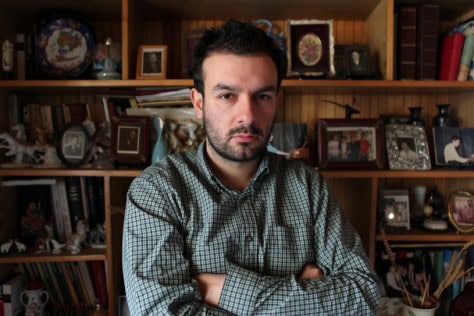This week sees the arrival of two Criterion Collection releases that in addition to being of interest to film buffs, will also appeal to fans of Japanese author Yukio Mishima. The first is the two-disc set of director Paul Schrader’s often overlooked 1985 film, Mishima: A Life in Four Chapters; the second is 1966’s Patriotism, which Mishima directed, wrote and starred in himself.
From the end of World War II until his death, Yukio Mishima was postwar Japan's most successful writer, both commercially and critically. He was one of the rare Eastern writers to achieve notoriety outside of Japan, attaining faithful readership in both Europe and America. Despite all of this, Mishima is often remembered more for the way he died than the life he lived. On November 25, 1970, shortly after finishing the final part of his Sea of Fertility tetralogy, Mishima and four other members of his right-wing political group attempted a half-hearted coup at the headquarters of Japanese Self Defense Forces. The coup failed but Mishima proceeded to commit seppuku – a form of ritual suicide – which was likely his real intention the whole time. The author's final day is the basis for Schrader's Mishima: A Life in Four Chapters.
It is hard not to recognize Mishima’s impact on postwar Japan, something which Schrader covers throughout the film’s two-hour duration. Kim Hendrickson, the discs' executive producer, said, “[Schrader] was interested in the way a writer could have such a societal impact.” Schrader and Ken Ogata, who plays Mishima, portray the writer trying to come to terms with himself, his art, and his role in society. Mishima wrote—and benefited—from the changes that Japan was going through at the time, yet he still longed for the past and tradition, something which many Japanese could relate to at the time.
As with any biopic, Schrader was faced with the task of faithfully transferring a person's life to the screen while still maintaining the audience’s interest. This problem was further complicated by the fact that Mishima, despite his myriad of other activities, was known first and foremost as a writer. According to Hendrickson, “Writers spend most of their life writing and Paul realized you had to figure out a different way of bringing this to life.” The way Schrader went about this was by including stylized dramatizations of three Mishima novels: The Temple of the Golden Pavilion, Kyoko's House, and Runaway Horses. These are interspersed between black-and-white flashbacks from Mishima's life and scenes of his last day. All three stories, along with the rest of the movie’s scenes, paint a picture of a man so obsessed with art, beauty and tradition that he becomes determined to turn his death into his greatest creative triumph and statement.
The film itself is a true work of art. Every shot, set, and costume is gorgeous. The novel scenes in particular have the look of the most vivid dreams, filled with lushness that is extremely pleasing to the eye. Each story also comes with a unique visual approach that sets it apart from the others. It is something that cinematographer John Bailey and set and costume designer Eiko Ishioka deserve to be commended for. Punctuating the feel of the film is Phillip Glass’s revolutionary and haunting score. Schrader’s attention to aesthetics is fitting, considering that Mishima himself considered nothing as important to life as art and beauty.
Schrader must also be given credit for allowing the audience to come to their own conclusions in regards to Mishima. At this point viewers have become accustomed to biopics being overly sympathetic towards their subjects. Schrader avoids this completely though; instead he tries to show Mishima in as objective a light as possible, something which is awfully refreshing. On view are Mishima's virtues and many flaws. He is shown with strong belief in his convictions, even when they may be opposed to those of others. But he is also portrayed as a man of contradiction, something which is not much of a surprise to anyone familiar with the writer's work.
Patriotism is not nearly as grandiose or epic as Mishima: A Life in Four Chapters, but it is no less important. Based on Mishima's novelette of the same name, it tells the story of a soldier who makes a suicide pact with his wife. It was a work that was particularly dear to him, as Hendrickson said, “Mishima considered Patriotism his favorite novelette.” The dark and startlingly violent tale is filmed in an appropriately stark black-and-white style. The film—which Mishima wrote, starred in and co-directed with Domoto Masaki—is a meditation on sepuku and shows Mishima's obvious obsession with the way of the samurai. In doing so, it also highlights Mishima's resistance to change and his refusal to give up on Japan's past, one of the main reasons he has fallen out of favor with many Japanese in the decades proceeding his death. That said, the film is no less interesting especially when one considers the film’s foreshadowing of Mishima's death just four years later.
It is great to see films like Mishima: A Life in Four Chapters and Patriotism get the deluxe treatment they deserve. Over the years, both movies—like Mishima himself—have drifted from the public's consciousness. But hopefully these rereleases will rectify this, because they and Mishima are classics of the utmost caliber.
 Q&A with Larry Gus
Q&A with Larry Gus We Own the Night: The Edison
We Own the Night: The Edison
No Comments